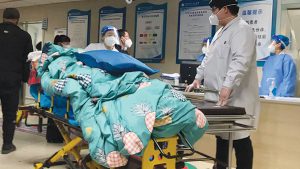Bloomberg
China’s economy continued to slow in December as the massive Covid-19 outbreak spread across the country, with activity slumping as more people stay home to try and avoid getting sick or to
recover. Bloomberg’s aggregate index of eight early indicators showed a contraction in activity in December from an already weak pace in November and the outlook is grim for the new year.
Although there’s no reliable data on the extent of the spread of the virus or the number of sick and dead now, it had reached every province before the end of extensive and regular testing. The canceling of almost all domestic restrictions now means the virus can circulate freely.
Even before the curbs were lifted, China’s economy was struggling, with a slump in consumer spending deepening
and industrial output growing the slowest since the spring lockdowns. The situation was even worse for shops and restaurants in Beijing than it was across the nation as a whole, with retail sales in the city dropping almost 18% in November as both cases and restrictions in the capital increased.
However, even though people are now free to move around there’s been little rebound in movement so far this month, according to high-frequency data on subway and road usage.
The 3.6 million trips made on the Beijing subway were 70% below the level on the same day in 2019, and traffic congestion on the city’s streets was only 30% of the level in January 2021, according to BloombergNEF. Other major cities like Chongqing, Guangzhou, Shanghai, Tianjin and Wuhan are seeing a similar drop.
That looks to be impacting home and car sales, which both fell in the first weeks of this month.
Car sales had been supported by government subsidies and were a bright spot for consumer spending this year, but began dropping last month as consumers pulled back. That in turn hit industrial output, with production of cars dropping for the first time since May, when many factories were forced to close.
However unlike in the spring when it was the Covid Zero policy which caused a shortage of car parts and shuttered some plants, now it is the virus itself which is impacting production, with companies having to deal with more workers getting sick.
 The Gulf Time Newspaper One of the finest business newspapers in the UAE brought to you by our professional writers and editors.
The Gulf Time Newspaper One of the finest business newspapers in the UAE brought to you by our professional writers and editors.
